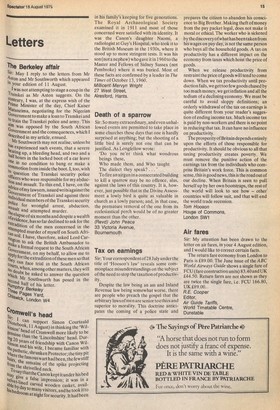Tax on earnings
Sir: Your correspondent of 28July under the title of 'Hooson's law' reveals some commonplace misunderstandings on the subject of the need to stop the taxation of productivity.
Despite the law being an ass and Inland Revenue law being somewhat worse, there are people who preach the gospel that the arbitrary laws of men are senior to ethics and superior to morality. This doctrine anticipates the coming of a police state and prepares the citizen to abandon his conscience to Big Brother. Making theft of money from the pay packet legal, does not make it moral or ethical. The worker who is sickened by the discovery of what hasbeen taken from his wages on pay day, is not the same person who buys all the household goods. A tax on productivity has a different impact on the economy from taxes which hoist the price of goods.
When we release productivity from restraint the price of goods will tend to come down. When we tax productivity until production fails, we get too few goods chased by too much money, we get inflation and all the tedium of a declining economy. We must be careful to avoid sloppy definitions; an orderly withdrawal of the tax on earnings is quite different from your reader's suggestion of ending income tax. Much income tax is paid by non-workers and there is no point in reducing that tax. It can have no influence on productivity.
The prosperity of Britain depends entirely upon the efforts of those responsible for productivity. It should be obvious to all that taxing productivity creates poverty. We must remove the punitive action of the earnings tax from the individuals who comprise Britain's work force. This is common sense, this is good news, this is the road out of our decline. When Britain is seen to pull. herself up by her own bootstraps, the rest of the world will look to see how — other' countries will follow suit, and that will end the world trade recession.
Tom Hooson Houpe of Commons, London SW1






























 Previous page
Previous page